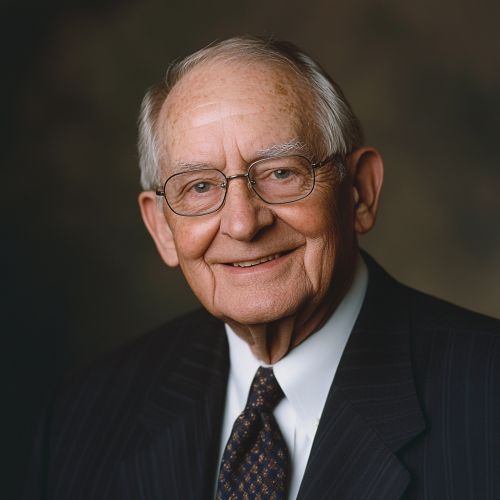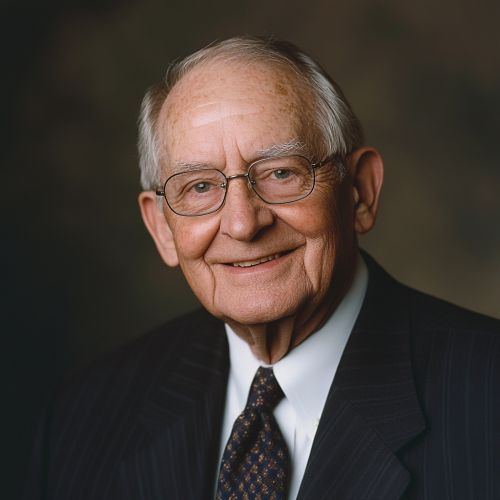Charles E. Lindblom: Difference between revisions
(Created page with "== Early Life and Education == Charles Edward Lindblom was born on March 21, 1917, in Muskegon, Michigan. He pursued his undergraduate studies at the University of Michigan, where he earned a Bachelor of Arts degree in 1939. Lindblom continued his education at the University of Chicago, obtaining a Master of Arts in 1940 and a Ph.D. in 1943. His academic background laid a strong foundation for his future contributions to political science and publi...") |
No edit summary |
||
| Line 39: | Line 39: | ||
* Lindblom, Charles E. "Politics and Markets." Basic Books, 1977. | * Lindblom, Charles E. "Politics and Markets." Basic Books, 1977. | ||
[[Image:Detail-97643.jpg|thumb|center|Portrait of Charles E. Lindblom, an elderly man with glasses, dressed in a suit and tie, smiling at the camera.|class=only_on_mobile]] | |||
[[Image:Detail-97644.jpg|thumb|center|Portrait of Charles E. Lindblom, an elderly man with glasses, dressed in a suit and tie, smiling at the camera.|class=only_on_desktop]] | |||
Latest revision as of 22:36, 18 August 2024
Early Life and Education
Charles Edward Lindblom was born on March 21, 1917, in Muskegon, Michigan. He pursued his undergraduate studies at the University of Michigan, where he earned a Bachelor of Arts degree in 1939. Lindblom continued his education at the University of Chicago, obtaining a Master of Arts in 1940 and a Ph.D. in 1943. His academic background laid a strong foundation for his future contributions to political science and public administration.
Academic Career
Lindblom began his academic career at the University of Minnesota, where he served as an instructor and later as an assistant professor. In 1950, he joined the faculty at Yale University, where he would spend the majority of his career. At Yale, Lindblom held various positions, including Professor of Political Science and Economics, and he was instrumental in shaping the university's political science program.
Incrementalism and Decision-Making Theory
Lindblom is best known for his work on incrementalism, a theory of decision-making that emphasizes small, gradual changes rather than large, radical shifts. His seminal work, "The Science of 'Muddling Through'" (1959), argued that policymakers often rely on incremental adjustments to existing policies rather than comprehensive overhauls. This approach, he contended, is more practical and realistic given the complexities and uncertainties inherent in policy-making.
Incrementalism contrasts sharply with the rational comprehensive model, which advocates for a thorough analysis of all possible alternatives and their consequences before making a decision. Lindblom's incrementalism suggests that such exhaustive analysis is often impractical due to limited time, information, and resources.
The Intelligence of Democracy
In his book "The Intelligence of Democracy" (1965), Lindblom expanded on his ideas about incrementalism and decision-making. He introduced the concept of "partisan mutual adjustment," where different interest groups and stakeholders negotiate and compromise to reach decisions. This process, he argued, allows for more adaptive and responsive governance.
Lindblom's work in this area highlighted the importance of pluralism in democratic societies. He believed that the interaction of diverse interests and perspectives could lead to more effective and equitable policy outcomes. His ideas have had a lasting impact on the study of public administration and policy analysis.
Market and Non-Market Decision-Making
Lindblom also made significant contributions to the understanding of market and non-market decision-making processes. In his book "Politics and Markets" (1977), he examined the interplay between economic and political systems. He argued that both markets and governments have their strengths and weaknesses, and effective governance requires a balance between the two.
He introduced the concept of "polyarchy," a term used to describe a form of government in which power is dispersed among multiple actors and institutions. This dispersion of power, according to Lindblom, can help prevent the concentration of authority and promote democratic governance.
Critiques and Legacy
Lindblom's work has been both influential and controversial. Critics of incrementalism argue that it can lead to policy stagnation and an inability to address urgent or systemic issues. However, supporters contend that incrementalism provides a realistic framework for understanding how decisions are made in complex and uncertain environments.
Lindblom's ideas have had a profound impact on the fields of political science, public administration, and policy analysis. His emphasis on pragmatic, adaptive decision-making continues to resonate with scholars and practitioners alike.
Personal Life
Charles E. Lindblom was known for his dedication to his students and his commitment to academic rigor. He was married to his wife, Helen, and they had two children. Lindblom passed away on January 30, 2018, leaving behind a legacy of scholarly contributions that continue to shape the study of political science and public administration.
See Also
References
- Lindblom, Charles E. "The Science of 'Muddling Through'." Public Administration Review, 1959.
- Lindblom, Charles E. "The Intelligence of Democracy." Free Press, 1965.
- Lindblom, Charles E. "Politics and Markets." Basic Books, 1977.


